On World Refugee Day, the International Rescue Committee (IRC) in Salt Lake City is raising up the voices of refugees resettled in Utah to speak about their experiences since arriving.
Meet your neighbors. They came not knowing what life in Utah would look like, only that it would be better. It had to be better.
Meet your community. Their dreams of the future became plans for survival. They never lost their capacity to dream, though. Their hope is boundless.
Meet survivors. Meet refugees. They live next door, learning what it means to reimagine life. They are thriving, persevering, breathing alongside us. In the face of pandemics and social injustice, their determination inspires us. Their humanity reminds us how close our lives are to each other. This World Refugee Day, and every day, our lives are touched by the world they are helping to shape.
Meet Elie.
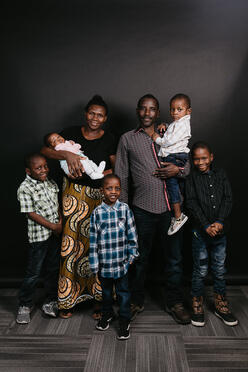
Elie and Delphine met in a refugee camp in Kenya. Both of them had fled from Burundi. They married in the camp where they met. They began to raise their family there. Their four boys knew no other home, not the one their parents had escaped nor the one they would travel to. This year has brought them a new home, Utah, and a little sister, Abigail.
“For me, life is good,” Elie says. “Because I don’t have much stress, I just know what I can do and what I cannot do. I know my limitations, my weaknesses and my strengths. Because I live in this city, it gives my heart time to be here. It’s like, everything is remarkable, everything is something to remember.”
Elie speaks with his heart full of hope. “When you come, you come as a refugee, but once you arrive here you have hope that you are preparing that after some days, you will no longer have that title as a refugee... If you want to leave you have to prepare yourself and always, always think positive. Then you will lead a better life. And your life will never be the same again. You have to open your mind, you have to think about how you can construct your life, how you can recover what you have lost.”
“I was always preparing in my mind that whatever comes, I will have to face it. So, up to now, things are pretty positive. Things are positive on my side and I expect more good to come and I believe this while I still live under the sun.”
Meet Kaltum.
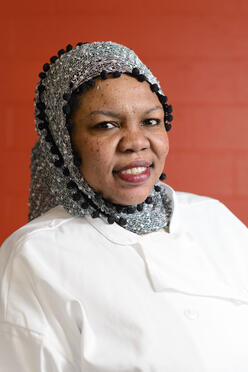
Kaltum arrived with her family in 2013. A refugee from Sudan, everything in Utah was unfamiliar. “At first, everything was difficult for me,” she says. “I couldn’t speak English, I couldn’t drive, I didn’t know where to get my spices. Now, everything is easy for me.”
In 2014, she started working with Spice Incubator Kitchen, a program of the IRC in Salt Lake City, where her catering business, Mother of All, came to life. Her full name, Um-Kaltum means “Mother of Kaltum” which inspired the name of her business. Spice Kitchen helped her find a food truck and apply for loans to start making food for people. She loves to cook. She started as a small girl working by her mother’s side in the kitchen, to cooking food for people in Libya and Egypt.
Until last year, she was able to do what she loved here in Utah. Then, her food truck was in an accident on the freeway. Spice Kitchen was there again to walk alongside her on the path to reviving her business. “Everybody at Spice [Kitchen] helps me,” she says. “They helped me get my food truck and my loan. They are too good.”
In her free time, Kaltum loves to walk around Liberty Park. There, she is often stopped by people who tell her how much they love her food.
Meet Amina, Leila & Hadje.
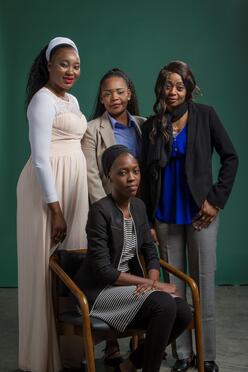
Amina, Leila, and Hadje are now roommates who individually fled the Central African Republic to find safety and eventually resettled in the United States. In Utah, they quickly became friends. The community that they create means everything to them.
“Here I have my friends,” Amina says. “We do everything together.”
This is also why Hadje loves the movie theater so much. “It’s huge!” She exclaims, grateful for a place where all of her friends can go together. She and Leila also love barbeques at Liberty Park. They always prefer to be together and cook with one another. Pizza and ice cream, the hallmarks of childhood for so many who grow up in the United States, have also become favorite treats for these roommates.
Hadje says that before she arrived, she was worried she would not feel at home, but since arriving, she has felt at home. There’s always some at the IRC to guide her. Plus, she has noticed that in Utah, “everybody talks with everybody,” which she appreciates. Her favorite experience has been learning English and everything taught by the IRC. She hopes to learn English really well and then begin working in a bank as she did in Africa.
Meet Yaya.
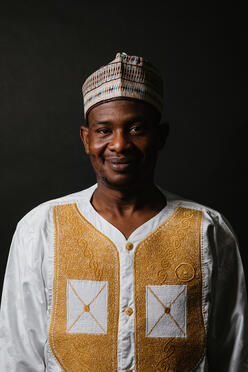
“Utah is good,” Yaya says. “It has security.” Yaya, a refugee from the Central African Republic, has lived in Utah for a little over a year. He works at Amazon where he prints designs. Although his first printing job did not turn out well, he has since been commended by a few managers. They come and observe his work, impressed with how well he knows his job. He even trains other workers. “I’m happy, I have experience,” Yaya says. “I have experience and give it to others.”
“It’s a good city,” Yaya says, reflecting on Utah’s capital. “It’s so big!” His friends at work have also encouraged him to see the mountains, and now that he has a car, he just might. He enjoys being here and appreciates the kindness shown to him by people every day. His life here is good and more than anything he looks forward to his wife and three-year-old daughter joining him someday very soon.
Meet Moussa.
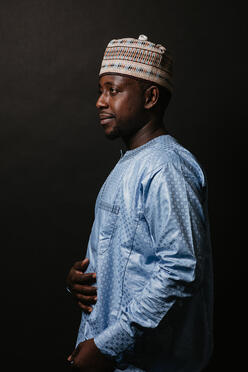
"Life is very comfortable,” Moussa says. “One of the things that touched me the most was how people welcomed me. The way they pick us up from the airport and give us a nice meal.”
Surprisingly, one of his favorite places to go is the gym. “It becomes a habit, like drinking coffee,” he says. “It’s become a comforting place. Everybody is doing things their own way. It’s a good place to see a variety of people.” Since being here, he has observed how people act appreciative. “Everyone is very polite.”
Although initially afraid that there wouldn’t be anyone who spoke French or Arabic and that nobody would understand him, he has found plenty of people who speak his language. Sara Hussein, a senior caseworker at the IRC in Salt Lake City, began to speak to him in Arabic when he first arrived. “I thought: ‘oh, I'm home.’”
When he still lived in the Central African Republic, he studied law due to the marginalization of his community. Now in the United States, he is back at square one, studying to earn his GED. He hopes that one day he can study law at the University at Utah, believing the work he sought to do in Africa can be done here, too. It has been discouraging for people to tell him that none of his education could be transferred here and that he won’t be able to study at the university.
Jen Dean, volunteer coordinator at the IRC in Salt Lake City, is the only person who encouraged him otherwise. Although it will be difficult, it is not impossible.
Meet Amira.
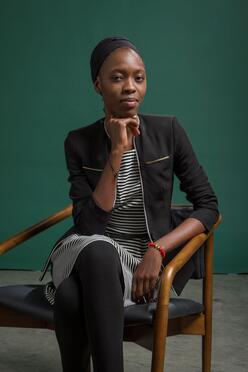
Amira arrived as a refugee to the United States from the Central African Republic. Here, she landed her dream job in digital marketing. She works at a family-owned business where her potential was seen immediately.
“What touched me the most,” Amira says. “Is that they said: make yourself at home, if there’s something you need, let us know.” They meant it, too. When Amira needed to move, they helped her. “This means I'm not just working with them, I building a relationship with them,” she reflected.
What stands out to Amira is the gratitude of people in Utah. “I will always pick the example of where I’m working,” Amira says. “The CEO thanks me for what I do, it’s just my job, they pay me for this, but he said ‘thank you so much, we wouldn’t be a company without you.’ I was impressed. It’s not just about him, it’s about people.”
Amira has many projects that she dedicates herself to. This summer, she is running for Miss Africa, a cultural scholarship program. “I’m running for my community. I am trying to build this dream.” Her other project is PreventHer, an educational platform about breast cancer for refugee and immigrant women.
Amira has learned that she is adaptable. “I just came here alone,” she says. “I’ve been here for a year, it’s really hard sometimes. Everybody is coming here, is facing this big world alone. I came with my ambitions, I came with my dreams. I’m stronger than I believed.”
This World Refugee Day, and every day, we celebrate refugees in Utah and around the globe. Learn more about refugees the IRC serves by visiting Rescue.org/WorldRefugeeDay.
Give a gift of welcome to ensure refugees like Amira, Elie, Hadje and so many more positively integrate and thrive in their new home: Rescue.org/GiveSLC.